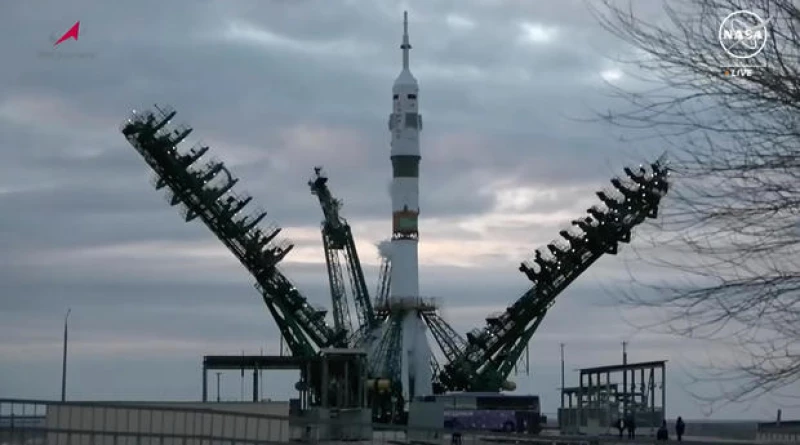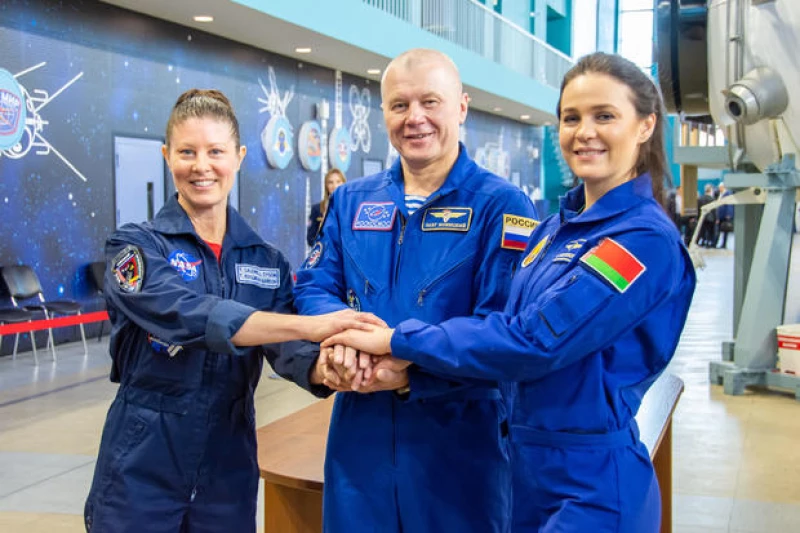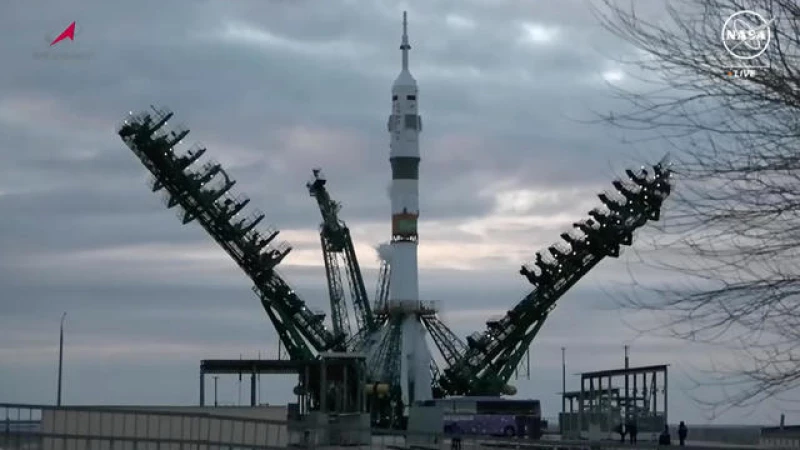Launch of a Russian Soyuz rocket carrying a cosmonaut commander, a guest flier from Belarus and NASA astronaut Tracy Dyson was aborted at the T-minus 20-second mark Thursday, delaying the crew's planned flight to the International Space Station.
With veteran commander Oleg Novitskiy at the controls, flanked on the left by Belarus spaceflight participant Marina Vasilevskaya and on the right by NASA veteran Tracy Dyson, the countdown was ticking smoothly toward liftoff at 9:21 a.m. EDT when an unidentified controller called an abort.

No explanation was immediately provided, but NASA's launch commentator said the crew was safe and the rocket was in a stable configuration as ground crews began re-erecting launch pad gantries to gain access and to help Novitskiy, Vasilevskaya and Dyson out of the Soyuz MS-25/71S spacecraft at the top of the booster.
NASA commentator Rob Navias in mission control at the Johnson Space Center in Houston said the next launch opportunity is Saturday, which would set up a docking at the space station Monday. But he said that would depend on the nature of the problem that triggered the abort and what might be required to fix it.
Flight controllers in Houston informed the space station crew that the Soyuz launch had been aborted and confirmed that its crew was safe. The message ended with the reassurance that "it's going to be a few days before you guys have visitors up there."
Meanwhile, SpaceX engineers continued their preparations to launch a Falcon 9 rocket from Cape Canaveral at 4:55 p.m. EDT. The rocket will carry a Dragon cargo ship to the station, loaded with 6,200 pounds of science gear, spare parts, and crew supplies.
The flight plan scheduled the Cargo Dragon to rendezvous with the station and dock early Saturday.
Upon arrival, Novitskiy, Vasilevskaya, and Dyson will join ISS commander Oleg Kononenko, cosmonauts Nikolai Chub and Alexander Grebenkin, and NASA astronauts Loral O'Hara, Matthew Dominick, Michael Barratt, and Jeanette Epps.
Vasilevskaya, a skilled ballroom dancer and flight attendant with Belavia Airlines, is the first citizen of Belarus, a strong ally of Russia, to be selected for a spaceflight since the dissolution of the Soviet Union. She was chosen as a "spaceflight participant" through a national competition and will conduct research for Belarusian scientists.

"I'm so proud to represent our republic, I'm so proud we have this project," she expressed before boarding the Soyuz for launch.
Dyson embarks on her third spaceflight, with this being her second journey aboard a Soyuz spacecraft. Despite the ongoing tension between the United States and Russia, the crew members seem to have a strong bond.
"Working with Marina has been a delightful experience," Dyson expressed. "Her positive attitude has been a great asset, especially during our emergency training sessions where we had to wear masks in challenging conditions. It has been a pleasure collaborating with her."
The team, consisting of Kononenko, Chub, and O'Hara, was sent to the space station on September 15 via the Soyuz MS-24/70S spacecraft. Dominick, Barratt, Epps, and Grebenkin were launched on March 3 using a SpaceX Crew Dragon ferry ship. This group, known as Crew 8, took over from the previous Crew 7 members who returned to Earth on March 12 after a brief handover period.
Novitskiy and Vasilevskaya are scheduled to spend 12 days on the space station. O'Hara will replace Dyson on the return journey, and the trio will come back to Earth using the same Soyuz MS-24/70S spacecraft that initially transported O'Hara, Kononenko, and Chub into orbit last September.
Kononenko and Chub are currently halfway through their planned yearlong mission aboard the station. If all goes according to plan, they will return to Earth in September next year, alongside Dyson, utilizing the Soyuz MS-25/71S ferry ship delivered by Novitskiy's team. O'Hara's return will mark the completion of the latest crew rotation sequence.







